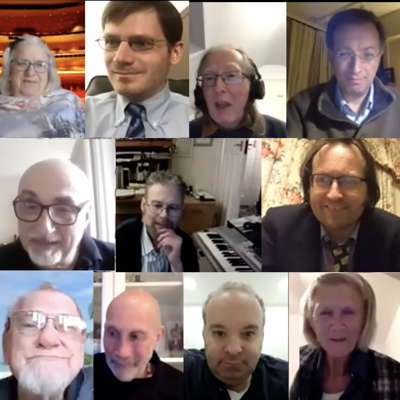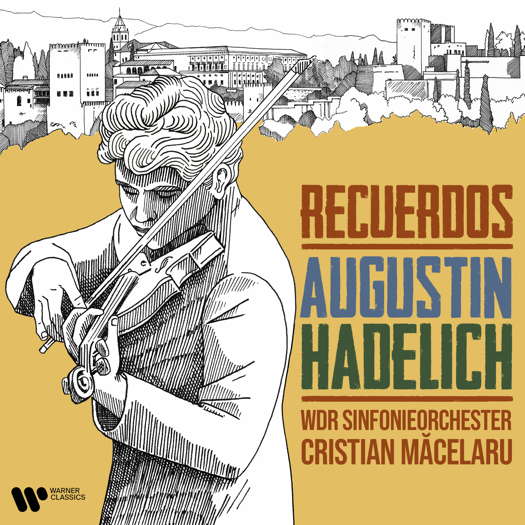 MET STARS: From 2002 until 2021 the late Maria Nockin reported from Arizona, mostly on live opera productions.
MET STARS: From 2002 until 2021 the late Maria Nockin reported from Arizona, mostly on live opera productions.
- Chandos Records
- Scelsi
- Steven Isserlis
- Werner Herbers
- Erno Dohnányi
- Clementi
- Merton College Oxford
- Elvis Presley of Russian classical music
 VIDEO PODCAST: James Ross and Eric Fraad discuss Streaming, Downloads and CDs with Maria Nockin, Mary Mogil, David Arditti, Gerald Fenech, John Daleiden, John Dante Prevedini, Lucas Ball and Stephen Francis Vasta.
VIDEO PODCAST: James Ross and Eric Fraad discuss Streaming, Downloads and CDs with Maria Nockin, Mary Mogil, David Arditti, Gerald Fenech, John Daleiden, John Dante Prevedini, Lucas Ball and Stephen Francis Vasta.

A Magnificent and Powerful Recording
GEOFF PEARCE listens to Augustin Hadelich
'... an impressive technique and tone ...'
Augustin Hadelich is one of those violinists who has inspired and delighted me since I first heard a recording some years ago. His online instructions on various aspects of violin playing and repertoire are very informative and I try to watch as many as I can. He has a wide ranging repertoire, including some composers whose violin works receive not as much exposure as they should: Enescu and Ysaÿe. He has performed all over the world and I am excited that he will be playing the Brahms concerto in Sydney later on this year and I will be able to attend.
The first work on this disc is a work by the great violinist and composer Pablo de Sarasate (1844-1908) - his Carmen Fantasy, Op 25. It is in five short movements. One thing that impresses me very much about Hadelich's playing is that he phrases very musically and beautifully, has a wide dynamic range and produces a great singing melodic line. He is also a great story teller and the tale of Carmen really comes alive. His playing is effortless, and whilst this is a virtuosic showpiece, one does not get the impression of a flashy player with no depth, in fact I enjoy his playing in the slower and lyrical sections as his music making seduces one. My only quibble is that sometimes, in the louder sections, the recording level in the orchestra is a little bit bright for my taste.
Listen — Sarasate: Allegro moderato (Carmen Fantasy)
(0190296309571 track 4, 0:00-0:38) ℗ 2022 Westdeutscher Rundfunk Cologne :
The second work, the Prokofiev Violin Concerto in G minor, Op 63, has a connection with the Spanish flavour of the first work, in the fact that the last movement employs castanets. The work was also partly written in Spain and received is premiere about six months before the outbreak of the Spanish Civil War. I think the soloist has a real affinity with this concerto as Prokofiev himself was a real story teller. Right from the outset of the first movement, one can sense that Augustin Hadelich has really captured the essence of this work with its broad sweep of melody and quick changes of mood and tempi. The technical demands are considerable, but this only enhances the narrative.
The second movement, a complete contrast to the first, is, in the violinist's words, 'one of the greatest melodies in the violin literature'. The violin soars over an accompaniment consisting of largely plucked strings and clarinet at first and this grows into a second section where the orchestral presence is more assertive, but in concert with the soloist. This movement, like the first, takes you off in quite a few directions and changes of tempi and mood, and again, Hadelich's ability as a story teller is paramount to making this a great performance.
Listen — Prokofiev: Andante assai (Violin Concerto in G minor)
(0190296309571 track 7, 7:08-8:01) ℗ 2022 Westdeutscher Rundfunk Cologne :
The final movement, a lively Russian dance, is full of colour and feels almost ecstatic but perhaps a little drunk too. Hadelich rises to the formidable technical requirements and his playing is colourful and effortless.
Listen — Prokofiev: Allegro, ben marcato (Violin Concerto in G minor)
(0190296309571 track 8, 3:40-4:25) ℗ 2022 Westdeutscher Rundfunk Cologne :
The Violin Concerto in D minor, Op 15 of Benjamin Britten is an early work, written when the composer was just twenty-three, in 1938. It was composed for the Spanish violinist Antonio Brosca, and was regarded by Britten as one of his greatest works. It has long been a favourite of mine, and I am pleased to see that, in the last few years, it has gained greater recognition. Britten was a firm pacifist, and given the time that the work was completed, some of the anguish he felt by the events of the Spanish civil war must have filtered through. This concerto has some very difficult passages for violin, and this may be one reason why it took quite a while to be readily taken up and performed.
After a timpani motif introduction - certainly an acknowledgement to Beethoven - the violin enters, lyrically and sweetly, but this soon rises in power into a frenzy, before a militaristic march takes over. Whilst the ferocity peters out and a slower, calmer section ends the movement, there is a general feeling of unease and disquiet that stays with one until the end of this movement.
Listen — Britten: Moderato con moto (Violin Concerto in D minor)
(0190296309571 track 9, 7:40-8:39) ℗ 2022 Westdeutscher Rundfunk Cologne :
The second movement takes off in a whirlwind of sound, and one can hear the influence of Prokofiev in this music as it becomes more frenetic. This is followed by the second subject, one of the most emotionally devastating sections of the concerto, and the section that made the strongest impressions on me when I first heard this piece. Hadelich says that the cadenza (which utilises musical material from both the second subject and also the motif from the opening of the first movement) pushes the soloist to his technical and emotional limits and his notes explain why it reinforces the musical anguish of the music.
Listen — Britten: Vivace - Animando - Largamento (Violin Concerto in D minor)
(0190296309571 track 10, 2:20-3:14) ℗ 2022 Westdeutscher Rundfunk Cologne :
The last movement, a passacaglia, is the longest of the three, and again, contains much contrast, from despair, trying to escape that despair, to 'a bombastic sense of patriotism'. This is a movement where the anguish of the composer, in a world where there seems little hope, is visceral. Hadelich says that performing this work is a devastating musical journey, no matter how often he performs it. I feel that he really owns this concerto, perhaps more than any other recording of it I have heard. (I have the recording by Mark Lubotsky with Britten conducting the English Chamber Orchestra. Which of these I prefer would be a toss up, but I think Hadelich has the emotional edge.)
Listen — Britten: Passacaglia (Violin Concerto in D minor)
(0190296309571 track 11, 8:28-9:20) ℗ 2022 Westdeutscher Rundfunk Cologne :
The final work is an arrangement of Recuerdos de la Alhambra by Francisco Tárrega (1852–1909), originally a work for guitar depicting the composer's recollections of the Alhambra, the citadel and palace at Granada, built by Moorish kings in the thirteenth century. This is a beloved work of guitarists and is a poignant piece. It is not out of place on this album, as it reflects a feeling of loss. This arrangement for solo violin by Ruggiero Ricci works very well and it is deceptively difficult (as it is for classical guitar to affect a totally even tremolo).
Listen — Tárrega, arranged Ricci: Recuerdos de la Alhambra
(0190296309571 track 12, 0:00-0:56) ℗ 2022 Westdeutscher Rundfunk Cologne :
This is a magnificent and powerful recording, and the programming is varied and interesting. Augustin Hadelich is a violinist with an impressive technique and tone, but more than that, he is a musician who thinks a great deal about the nature of the works he is performing, and I have yet to hear a recording of his that does not completely convince me. There are times, in the louder sections, particularly in the Sarasate, where I find the recording quality a bit bright for my taste, but this does not really detract from my enjoyment of the disc, because the orchestra and direction are everything I would hope they would be. Another thing that I find a real plus is the insightful notes written by the soloist, which not only describe the works without bogging down the reader, but also detail Hadelich's emotional response to these pieces. This recording would take a prize place in anyone's collection.
Copyright © 22 August 2022
Geoff Pearce,
Sydney, Australia

CD INFORMATION: RECUERDOS - AUGUSTIN HADELICH


